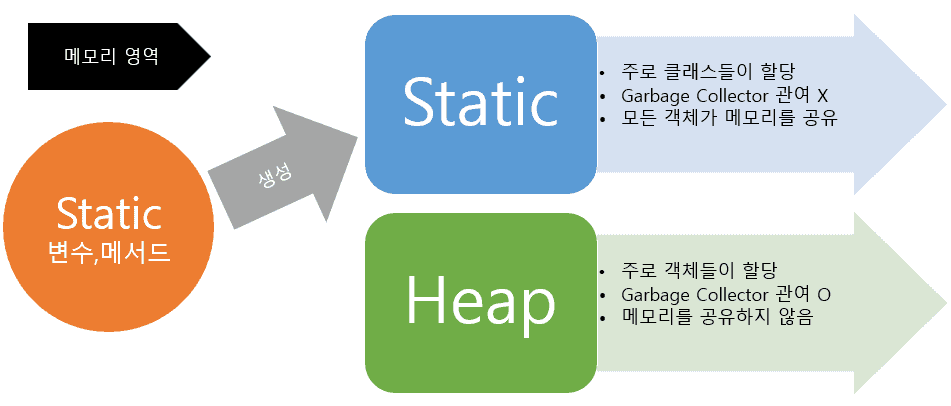[Java] static, final, static final
April 13, 2023
final
final은 최종적인 이라는 뜻으로 한번 값이 저장되면 변경이 안된다는 의미이다.
public class Shop{
final int closeTime = 21;
final int openTime;
public Shop(int openTime){
this.openTime = openTime;
}
}
위의 예제는 가게는 오픈시간은 Shop이라는 인스턴스를 생성하면서 정할 수 있지만 변경가능한 closeTime과는 다르게 한번 저장된 후에는 변경이 불가능하다.
final 변수
변수에 final을 붙이면 이 변수는 수정할 수 없다는 의미가 된다. 수정할 수 없기 때문에 초기화가 필수적이고 생성자, static 메소드를 이용한 초기화도 허용된다.
초기화한 후 변경하려고 하면 compile 에러가 난다.
final String hello = "Hello world";
hello = "See you around" // compile error!final arguments
final로 선언된 인자는 메소드 내에서 변경이 불가능하다. 따라서 다음과 같이 final int로 선언한 number는 읽을 수 있지만, number = 2처럼 값을 변경하려고 하면 컴파일 에러가 발생한다.
public void func(final int number) {
System.out.println(number);
number = 2; // compile error!
}final class
클래스에 final을 붙이면 다른 클래스가 상속할 수 없는 클래스가 된다. 다음과 같이 final 클래스를 상속하려고 하면 컴파일 에러 발생한다.
final class Person {
final String name;
Person() {
this.name = "Chaerin";
}
}
class Student extends Person() { // compile error!
}
final method
final 메소드는 Override가 안되도록 한다. 예를 들어 다음과 같이 Person 클래스를 상속하는 Student 클래스에서는 sayHi()를 재정의할 수 없다. Override하려고 하면 컴파일 에러가 발생한다.
public class Person {
final String sayHi() {
return "hi";
}
}
class Student extends Person() {
@Override
String sayHi() { // compile error !
return "See you";
}
}
static
static 멤버는 클래스에 고정된 멤버로서 객체를 생성하지 않고 사용할 수 있는 필드와 메서드를 말한다.

Static 키워드를 통해 생성된 정적멤버들은 Heap영역이 아닌 Static영역에 할당됩니다. Static 영역에 할당된 메모리는 모든 객체가 공유하여 하나의 멤버를 어디서든지 참조할 수 있는 장점을 가지지만 Garbage Collector의 관리 영역 밖에 존재하기에 Static영역에 있는 멤버들은 프로그램의 종료시까지 메모리가 할당된 채로 존재하게 된다. 그렇기에 Static을 너무 남발하게 되면 만들고자 하는 시스템 성능에 악영향을 줄 수 있다.
static field 사용 예시
class Number{
static int num = 0; //클래스 필드
int num2 = 0; //인스턴스 필드
}
public class Static_ex {
public static void main(String[] args) {
Number number1 = new Number(); //첫번째 number
Number number2 = new Number(); //두번쨰 number
number1.num++; //클래스 필드 num을 1증가시킴
number1.num2++; //인스턴스 필드 num을 1증가시킴
System.out.println(number2.num); //두번째 number의 클래스 필드 출력
System.out.println(number2.num2); //두번째 number의 인스턴스 필드 출력
//출력결과: 1 0
}
}위의 예시의 출력결과가 1, 0 인 이유는 static 변수는 static 공간에 할당되어 모든 instance들이 공유하기 때문에 number1에서 증가시킨 value가 남아있게 된다.
class Name{
static void print() { //클래스 메소드
System.out.println("내 이름은 홍길동입니다.");
}
void print2() { //인스턴스 메소드
System.out.println("내 이름은 이순신입니다.");
}
}
public class Static_ex {
public static void main(String[] args) {
Name.print(); //인스턴스를 생성하지 않아도 호출이 가능
Name name = new Name(); //인스턴스 생성
name.print2(); //인스턴스를 생성하여야만 호출이 가능
}
}위의 예시와 같이 static 메소드는 따로 인스턴스를 생성하지 않고 클래스이름.메소드이름 으로 사용할 수 있다.
🚨 static과 관련하여 발생했던 이슈
@Value("${api-key}")
static private String accessKey;위와 같이 application.properties에 있는 api-key값을 가지고 오는 과정에서 멤버 필드를 static으로 정의했을 때 값이 null로 들어오는 이슈가 있었다. application.properties 파일이 읽히기 전에 클래스가 로드되기 때문에 api-key의 value가 null로 들어왔고 static 영역에 메모리가 할당되어 이후에 변경이 일어나지 않은 것이다. 만일 static이 없다면 instance가 생성될 때 해당 값을 application.properties에서 읽어오기 때문에 정상작동한다.
static final
static final은 static 영역에 할당되며 수정불가능 하다는 뜻이므로 상수를 선언할 때 사용된다.
static final double PI = 3.141592;PI 변수는 객체마다 저장될 필요없고 하나의 값만을 가질 수 있다.